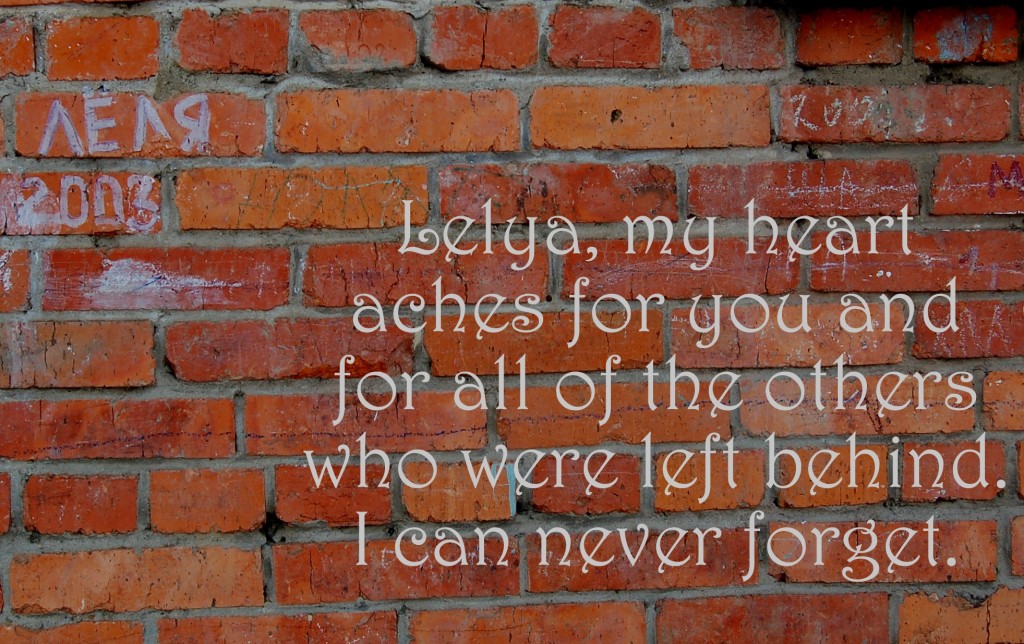Excuse Me, Do You Know Lelya?
Do you know Lelya? You probably don’t, but I’ve been looking for a long time. Lelya was an orphan. Well, maybe not technically. Those who try to downplay the orphan crisis say that most of the children in orphanages have at least one parent who is still alive. Chances are that technically speaking, Lelya was a “Social Orphan.” I guess that means we shouldn’t care about her. If a child like that needs care, then the person who birthed her, or one of the suspected fathers, should come forward and take care of her. Yeah, well as my dear old grandpa used to say, wish in one hand and… well, you get it. Nobody was coming back for Lelya. Maybe I and the rest of the world are supposed to ignore the names on that wall. Eventually, the names and dates, just like those who wrote them, will go away.
Lelya was only one of hundreds that claimed a couple of bricks for their name and a date on the wall of the Partizansk Children’s Home in Far East Russia. I don’t know why her name affected me more than the others. Perhaps it’s because I recognized those particular Cyrillic letters and could read her name. Maybe it was because the writing was bolder than most, as if she was crying out to be found.
I guess that as a Christian, I can hear others speculating about which side
of a firey divide she’ll end up on because it somehow “pleases God.”
Not that it matters. It didn’t work. I can say that with near certainty because of the height of the placement of the name on the wall, along with the mature construction of the four letters and four numbers. In Lelya’s world of Far East Russia, and even in my own world, somewhere in the United States, if you’re old enough to write with that kind of clarity and you don’t have active parents, you’re pretty much out of luck. Lelya probably wasn’t cute and cuddly when she wrote her name on that brick. Judging from teens that my wife and I adopted from that place and time would indicate she was cynical. She could probably swear like a sailor. I’m sure she scowled at people from behind the other wall, a barrier she used to hide her vulnerability in a world that wished she hadn’t troubled its conscience and its pocketbook.
I guess that as a Christian, I can hear others speculating about which side of a firey divide she’ll end up on because it somehow “pleases God.” Well, if that’s where Lelya is going to spend eternity, I’ll let you in on a little secret. She’s already there, even if she’s still alive.
I don’t believe you can earn a place in Heaven. I don’t believe that humans can get themselves into a state of grace. I don’t believe you can undo the bad that you have done in your life, simply because you do some good. Still, I think it’s high time we got off our backsides and did something for God rather than trying to determine that someone else’s suffering “pleases Him.”
Here’s what I don’t get. God spends decades giving us experiences and understanding. He helps us through the tough times. He strengthens us. He helps us to raise our children. Then suddenly, as we are at the apex of what He has created, our children are raised and we think that means we should spend the rest of our lives playing. We buy motor homes, or float around on opulent ships; we play golf or travel to far-away places. If we have not been blessed with financial excess, we still quit our jobs and putter around, wasting what God has turned us into.
It’s not that we decide not to take on an older child and give them a chance at life. We simply don’t even consider it. If we decided against helping an older child to have a life, that would be wrong! That would be a sin! But somehow we justify omitting such a calling.
Maybe that’s okay and maybe it’s not. But for the life of me, I can’t grasp the idea that the Perfect Father is pleased with the suffering of one like Lelya in this life, or for that matter, in any other one.



